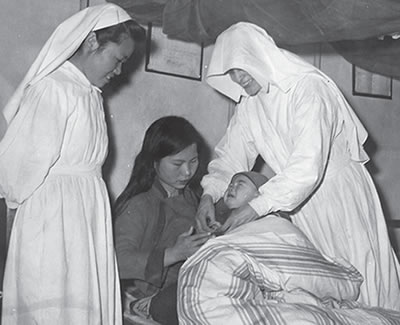
People’s activity is usually their response to the historical situations in which they find themselves. In 1918, Lady Frances Moloney had in mind “some kind of Sisterhood.” From 1918 to 1920 she was a prime mover in bringing this to reality. Fr. John Blowick, co-founder of the Missionary Society of St. Columban, referred to her as “the first live spark” of what became the Missionary Sisters of St. Columban. He saw her as “the woman sent by God.” Together they worked and prayed, planned and refined the Constitutions of the newly founded Missionary Congregation of Columban Sisters.
The context, in which Lady Frances Moloney’s dream for “some kind of Sisterhood” was born against the backdrop of war. In 1916, Europe was on the march. The 1914-1918 war was at its peak. The propaganda of war was in the air, and men were urged on to “great things.” Patriotism encouraged them to be willing to sacrifice everything for the love of their country. The challenge was great and many young men and not-so-young men marched into the battlefield to fight for the “great cause.” Some went proudly and gladly with heads held high and sureness in their steps. But some wondered and reflected on the death and destruction, crippled bodies and damaged minds. In the end, what would victory mean?
In 1916, China was coming to an awareness of herself. She was very aware of her great Empire and the vastness of her territories. She was also aware of her potential as a world power. Ireland in 1916 was awakening to the cause of freedom. Revolution was in the air, and the youth of the nation were not asleep.
The leaders of the movement were men and women of high ideals — poets, writers, scholars, mystics and idealists. Their goal was not merely that Ireland fight for freedom from foreign domination but that she become free to shape her own destiny and to make available to her sons and daughters the heritage of faith and culture which was rightly theirs. They aspired to take their place in the world in a manner worthy of God and country. They were in no doubt as to the greatness of their cause and the dedication which was necessary. They weren’t blind to the sacrifices which might be asked of them. Ireland was witnessing its rebirth, and like every birth it came by way of suffering. Padraig Pearse summed up his insight and understanding when he wrote:
“I turned my face to the road before me. To the deed I see and the death that will be mine.”